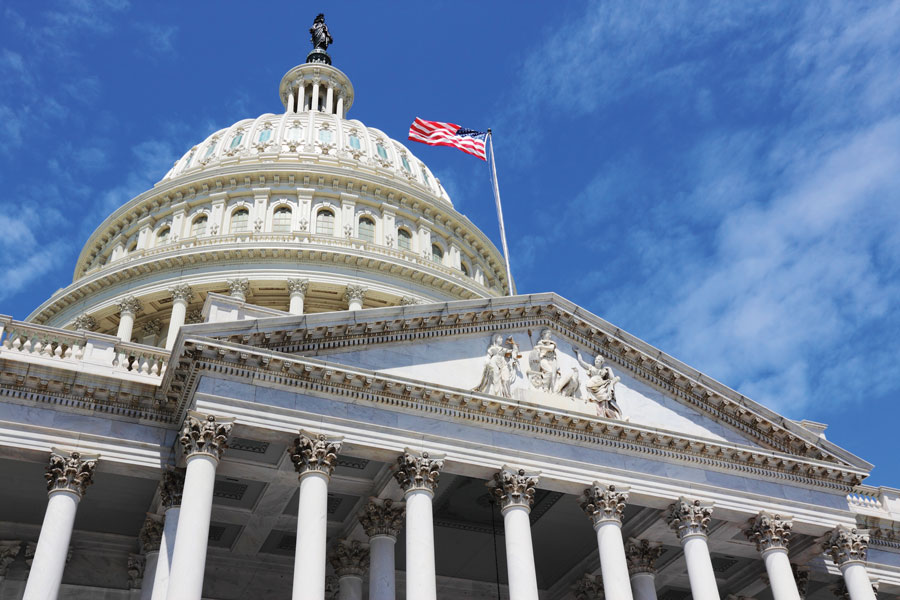

Democrats’ plan to undo President Donald Trump’s $10,000 cap on the state and local tax deduction is likely to end up enshrining looser restrictions on the popular and politically important write-off for the foreseeable future.
The ongoing debate over whether to expand the deduction, or SALT, as part of President Joe Biden’s economic plan has been one of the messiest spats among fractious Democrats as they try to pass a final tax and spending package in the coming weeks.
Lawmakers representing high-tax areas like New York and New Jersey are pushing to make the SALT deduction on federal income taxes a priority, while many progressive Democrats counter that that amounts to giving billionaires a huge tax cut.
The compromises that Democrats are looking to reach may mean that some version of the SALT cap -- currently slated to expire at the end of 2025 -- may be here to stay as lawmakers trade a future of unlimited tax breaks for tax cuts now.
“An unlimited deduction is dead and the question now is what kind of limitation,” said George Callas, a former House tax aide who helped write the 2017 tax law.
House Democrats have proposed increasing the cap to $80,000 from $10,000 through the end of the decade, which would actually add billions of dollars to federal coffers on paper over the period. Senate Democrats are working on a less generous option that would phase out the SALT deduction for those with about $400,000 or more in income, though the details of that proposal haven’t yet been fleshed out.
An outright repeal of the cap -- the first choice for SALT advocates including Reps. Tom Suozzi of New York and Josh Gottheimer of New Jersey -- is too costly, so lawmakers are looking at ways to provide a bigger tax break without adding to the deficit within the 10-year federal budget window.
Democrats have Republicans to thank for clearing the way for the budgeting tricks that will allow them to do that.
The existing $10,000 limit on SALT is scheduled to expire at the end of 2025, along with many of the other individual tax changes from Trump’s 2017 tax law. Republicans were forced to include that phase-out date so that their tax cuts didn’t add to the deficit beyond what was outlined within Senate rules.
The expiration means that congressional budget analysts have to assume that the cap would be fully lifted after 2025 because that is current law. As a result, if Democrats impose some sort of limit on the SALT deduction from 2026-2031, that counts as revenue for budgeting purposes that can be used to pay for a more generous SALT deduction in the short-term.
“If SALT had been a permanent provision, it would be hard to score as a revenue raiser,” said Garrett Watson, a senior policy analyst at the right-leaning Tax Foundation. “It’s an example about how temporary tax policy can beget more temporary tax policy.”
There’s no requirement that the assumed tax increases in the future years actually go into effect, so Democrats could theoretically expand the tax break now, and repeal or raise the cap in future years, meaning that the SALT expansion could actually add hundreds of billions of dollars to the deficit.
The debate about how to treat SALT has divided Democrats, because the benefits of the write-off are largely claimed by top-earning households and are largely concentrated among taxpayers in high-tax areas of the country.
Less than 1% of the benefit of repealing the SALT cap would go to the bottom 60% of earners, according to data from the Committee for a Responsible Federal Budget, whereas 54% of the tax savings would accrue to the top 1% of households. This has led Democrats to balance providing more generous SALT deductions to politically important suburban areas near New York City and in Southern California, while curbing some of the benefits for the richest Americans.
“It is really bizarre watching Democrats argue with each other over how many tax breaks to give to rich people,” said Len Burman, an institute fellow at the left-leaning Urban Institute. “Democrats are really raising the bar on these cynical budget gimmicks.”
Democrats who support an expansion to SALT say that middle-class voters in their districts were targeted by the $10,000 cap. The House agreement for an $80,000 cap “will put money back in the pockets of hardworking, middle class families in our districts and help ensure that our local communities can continue making the investments that we need,” Gottheimer, Suozzi, and Rep. Mikie Sherrill, a New Jersey Democrat, said in a statement about the proposal.
The lawmaker who is possibly most ready for the SALT bickering to end is House Ways and Means Chairman Richard Neal, who has served as the point person for negotiating the proposal among dozens of House lawmakers who have strong views about the topic. He said he’s now telling Democrats who want changes to talk directly with the Senate.
“It became like Armageddon for some members,” Neal said. “It was just wild.”

Relationships are key to our business but advisors are often slow to engage in specific activities designed to foster them.

Whichever path you go down, act now while you're still in control.

Pro-bitcoin professionals, however, say the cryptocurrency has ushered in change.

“LPL has evolved significantly over the last decade and still wants to scale up,” says one industry executive.

Survey findings from the Nationwide Retirement Institute offers pearls of planning wisdom from 60- to 65-year-olds, as well as insights into concerns.
Streamline your outreach with Aidentified's AI-driven solutions
This season’s market volatility: Positioning for rate relief, income growth and the AI rebound
